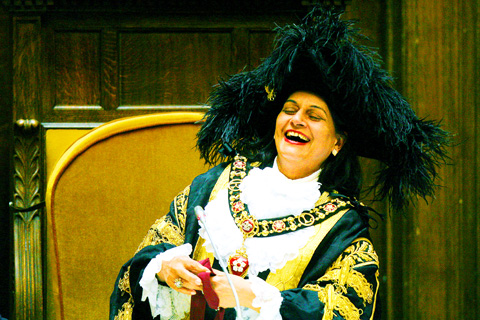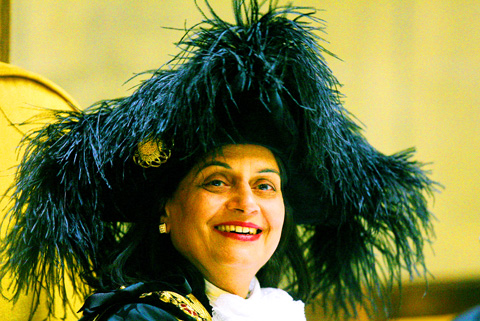Manjula Sood made history this week when she slipped the gilded robes and chain of office over her sari and became lord mayor of the British city of Leicester.
A south Asian woman has never held the largely ceremonial post in the 799 years since it was created in the city nor in the 1,000 years or so that it has been in existence elsewhere in Britain.
It is a first not just for Sood, 12 years after following her late husband, Paul, into local politics, and just over 38 years after she arrived in the English East Midlands from the Punjab on a cold, dark snowy winter’s day.

PHOTO: AFP
It is also the latest sign of the transformation of Leicester, famous for its textile, footwear and hosiery industry, as it moves towards becoming the UK’s first non-white majority city in the not too distant future.
“To be the first is a great honor for me,” the Indian-born former primary schoolteacher said of the 12-month post, which began on Thursday.
“It’s made me very proud of myself that I’m going to represent my city ... . I wasn’t expecting it.”

PHOTO: AFP
The appointment to lead Leicester’s 288,000 or so citizens, 25 percent of whom are of Indian origin, puts Sood among the UK’s establishment, although she has held the ancient post of High Bailiff of Leicester for the past year.
On a wider scale, it also says much about the positive aspects of immigration that are often overlooked here by the debate over the extent to which new arrivals benefit the UK and affect its culture and identity.
At a glance, Sood seems the embodiment of the successfully integrated immigrant championed by modern-day politicians, many of whom she says have been fed at her kitchen table and passed through while campaigning locally.
It is not just the immaculate black sari set off by the shiny Blackberry personal organizer, the comfortable semi-detached house in a residential suburb or the fact that she has taken UK citizenship and speaks fluent English.
There are photographs of her two grownup sons, in gowns and mortar boards, proudly clutching degree scrolls from British universities: one is also a municipal councilor in Leicester; the other works for an investment bank.
A framed woman of achievement and a national merit award from the governing Labour Party are hung on another wall.
On a corner table by the coal-effect gas fire is a photograph of Hindu guru Sathya Sai Baba next to medieval-style Christian religious icons and rosary beads.
An Anglican canon is a close friend; she sits on the Leicester Council of Faiths and social, health and women’s groups; two African Caribbean men have the keys to her house to do odd jobs, she says.
Sood says she feels a duty over the next 12 months to uphold Leicester’s largely harmonious diversity at a time when critics of multi-culturalism warn of no-go areas for non-whites and communities living parallel lives elsewhere.
“I’m going to be the lord mayor not for one faith but for the city of Leicester,” she said.
One of her spiritual advisers will be Christian. The other will be Hindu. The civic service to mark her appointment will also be held in the city’s Anglican cathedral rather than a Hindu temple.
“Leicester’s a British city,” she says. “I’m representing Leicester as first citizen. The religion of this country is Church of England.”
Sood, though, recognizes that her story is not typical of the vast majority of immigrants that came to the UK and that she was fortunate.
She spoke the language, held a master’s degree in sociology and came from a well-off family: her father was a doctor in New Delhi, her mother a teacher.
An assertive nature helped when she went into teaching after being told to settle for factory work like many newly arrived Indian women — or stay at home in often substandard accommodation.
But she said she still faced the same challenges of casual racism, ignorance and prejudice as the thousands of other Indians, Pakistanis, Bangladeshis, and Kenyans and Ugandans of South Asian ancestry who made their way to Leicester in the 1970s.
As the only Indian teacher among white faces she said she pushed to promote tolerance and understanding between often bewildered newly arrived children of different faiths and cultures and their local classmates. The UK is now a more tolerant place than the one she knew in 1970, she says, with people more respectful of diversity of culture and faith.
But work is still required as a new wave of immigrants, many of them from Eastern Europe, arrive in increasing numbers — and “outreach” is the aim of her term of office as lord mayor.
“The communities that came here in the 60s and 70s now feel an integrated part of British society. Now there are new communities finding the same problems,” she said.
“History is being repeated. The same challenges are facing them. There’s always some sort of hostility from the host community. It’s a human instinct but if we don’t work at it and don’t kill it, it will escalate.”

May 11 to May 18 The original Taichung Railway Station was long thought to have been completely razed. Opening on May 15, 1905, the one-story wooden structure soon outgrew its purpose and was replaced in 1917 by a grandiose, Western-style station. During construction on the third-generation station in 2017, workers discovered the service pit for the original station’s locomotive depot. A year later, a small wooden building on site was determined by historians to be the first stationmaster’s office, built around 1908. With these findings, the Taichung Railway Station Cultural Park now boasts that it has

The latest Formosa poll released at the end of last month shows confidence in President William Lai (賴清德) plunged 8.1 percent, while satisfaction with the Lai administration fared worse with a drop of 8.5 percent. Those lacking confidence in Lai jumped by 6 percent and dissatisfaction in his administration spiked up 6.7 percent. Confidence in Lai is still strong at 48.6 percent, compared to 43 percent lacking confidence — but this is his worst result overall since he took office. For the first time, dissatisfaction with his administration surpassed satisfaction, 47.3 to 47.1 percent. Though statistically a tie, for most

In February of this year the Taipei Times reported on the visit of Lienchiang County Commissioner Wang Chung-ming (王忠銘) of the Chinese Nationalist Party (KMT) and a delegation to a lantern festival in Fuzhou’s Mawei District in Fujian Province. “Today, Mawei and Matsu jointly marked the lantern festival,” Wang was quoted as saying, adding that both sides “being of one people,” is a cause for joy. Wang was passing around a common claim of officials of the People’s Republic of China (PRC) and the PRC’s allies and supporters in Taiwan — KMT and the Taiwan People’s Party — and elsewhere: Taiwan and

Six weeks before I embarked on a research mission in Kyoto, I was sitting alone at a bar counter in Melbourne. Next to me, a woman was bragging loudly to a friend: She, too, was heading to Kyoto, I quickly discerned. Except her trip was in four months. And she’d just pulled an all-nighter booking restaurant reservations. As I snooped on the conversation, I broke out in a sweat, panicking because I’d yet to secure a single table. Then I remembered: Eating well in Japan is absolutely not something to lose sleep over. It’s true that the best-known institutions book up faster